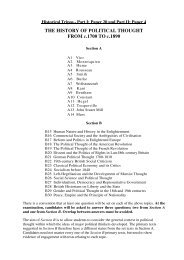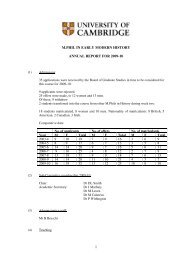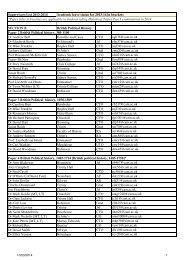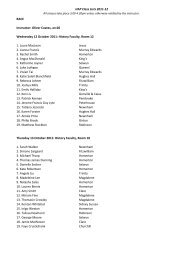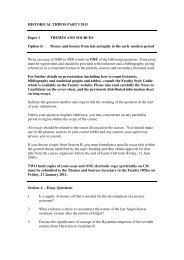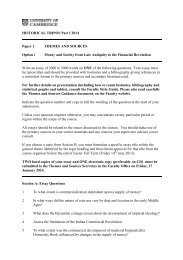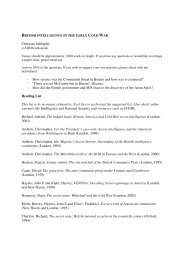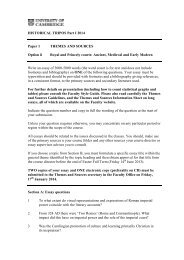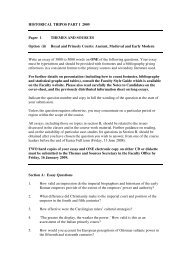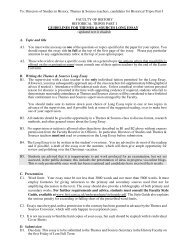Course Handbook - Faculty of History - University of Cambridge
Course Handbook - Faculty of History - University of Cambridge
Course Handbook - Faculty of History - University of Cambridge
You also want an ePaper? Increase the reach of your titles
YUMPU automatically turns print PDFs into web optimized ePapers that Google loves.
Whenever possible, the third reader’s mark should give a clear recommendation <strong>of</strong> Pass or Fail. If<br />
the third mark is a Pass the candidate is deemed to have passed. If the third mark is a Marginal or an<br />
outright Fail, a viva will be held.<br />
In the case <strong>of</strong> both examiners awarding a Marginal Fail, a third reader (normally the External<br />
Examiner) is consulted. If the third mark is a Pass or a Marginal Fail, a viva will be held. If the<br />
third mark is an outright Fail, the candidate will be deemed to have failed.<br />
If the outcome <strong>of</strong> such a viva is itself a marginal fail mark <strong>of</strong> 59, this would constitute a ‘marginal<br />
fail’ <strong>of</strong> Part II <strong>of</strong> the MPhil (dissertation), and point 3(b) <strong>of</strong> the Board <strong>of</strong> Graduate Studies<br />
‘Memorandum to Examiners and Assessors for the Degree <strong>of</strong> Master <strong>of</strong> Philosophy (one-year<br />
course) would apply, giving the Degree Committee discretion to judge whether the essays in Part I<br />
taken as a whole had achieved what the Memorandum calls ‘high performance’ and to take this into<br />
account in recommending a pass to the Board <strong>of</strong> Graduate Studies. Such ‘high performance’ would<br />
for this course be constituted by a set <strong>of</strong> essay marks none <strong>of</strong> which falls under 63 (and excluding<br />
for this purpose any mark <strong>of</strong> 59 which was not confirmed by a third marker). If such compensation<br />
is judged to be available, the candidate may be deemed to have passed the MPhil as a whole. If<br />
compensation is not available, the candidate will be deemed to have failed.<br />
13. FAILURE IN THE DISSERTATION<br />
In the case <strong>of</strong> one Passing or marginal fail mark (59), and one Failing mark (i.e. 58 or below) from<br />
examiners, the dissertation is sent to a third marker (normally the External Examiner). If the third<br />
mark is a clear Pass, the dissertation might be deemed to have passed, or a viva might be held. If that<br />
marker awards a Fail mark (i.e. 58 or below), the candidate will be deemed to have failed. If the<br />
third mark is a Marginal Fail, a viva will be held.<br />
The third reader will examine and award marks independently, without reference to the marks<br />
already awarded. Whenever possible, the third reader’s mark should give a clear recommendation<br />
<strong>of</strong> Pass or Fail.<br />
In the event <strong>of</strong> two clear failing marks, the candidate will be deemed to have failed. The dissertation<br />
might be sent to a third marker (normally the External Examiner), and if the third mark is a clear<br />
pass a viva will be held.<br />
In each case where a candidate is deemed to have failed, a viva may be held, but only if the<br />
candidate wishes it. Candidates must be informed <strong>of</strong> their right to request a viva in such cases. In<br />
the event <strong>of</strong> two low failing marks, it is appropriate to advise the student that a conversion <strong>of</strong> the fail<br />
to a passing mark, though theoretically possible, is in practice highly unlikely.<br />
Referral <strong>of</strong> the dissertation for further work and for re-examination at a later date is not permitted for<br />
MPhil dissertations. A fail mark (58 or below; or uncompensated marginal fail mark <strong>of</strong> 59)<br />
confirmed after the viva is grounds for failure <strong>of</strong> the MPhil course overall. The MPhil Sub-<br />
Committee sitting as Board <strong>of</strong> Examiners will make a recommendation to this effect to the Degree<br />
Committee <strong>of</strong> the <strong>Faculty</strong> <strong>of</strong> <strong>History</strong>. Any candidate who is deemed by the Degree Committee to<br />
have failed an MPhil course as a whole, may apply to the Board <strong>of</strong> Graduate Studies and the Degree<br />
Committee to be considered for the award <strong>of</strong> the Certificate <strong>of</strong> Postgraduate Study.<br />
14. VIVA VOCE EXAMINATIONS<br />
A viva will be required only for certain candidates who receive a failing mark (or a confirmed<br />
marginal fail) or in other special circumstances (e.g. suspected plagiarism) recommended by the<br />
examiners and/or determined by the MPhil Sub-Committee acting as Board <strong>of</strong> Examiners. Viva voce<br />
examinations (which normally last for thirty minutes) are held at a predetermined date (usually the<br />
day or the day before the Board <strong>of</strong> Examiners meet in mid to late September). All candidates are<br />
informed <strong>of</strong> this date well in advance. Unauthorised absence <strong>of</strong> a candidate from a viva implies a<br />
failure in the dissertation examination. Postponement <strong>of</strong> the viva will be allowed by the MPhil Sub-<br />
Committee only on the most serious (e.g. medical) grounds. If that happens the viva examiners will<br />
be notified immediately.<br />
The Academic Secretary <strong>of</strong> the MPhil Sub-Committee will call a viva voce examination by the two<br />
examiners <strong>of</strong> the dissertation jointly with the External Examiner acting as adjudicator. Vivas caused<br />
by a mark submitted by the External Examiner acting as a regular dissertation examiner are<br />
23





